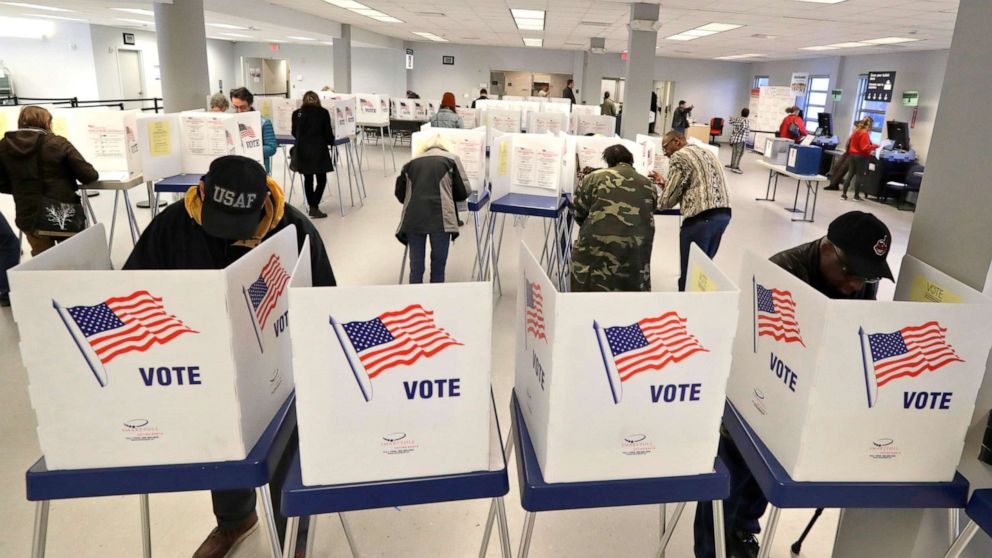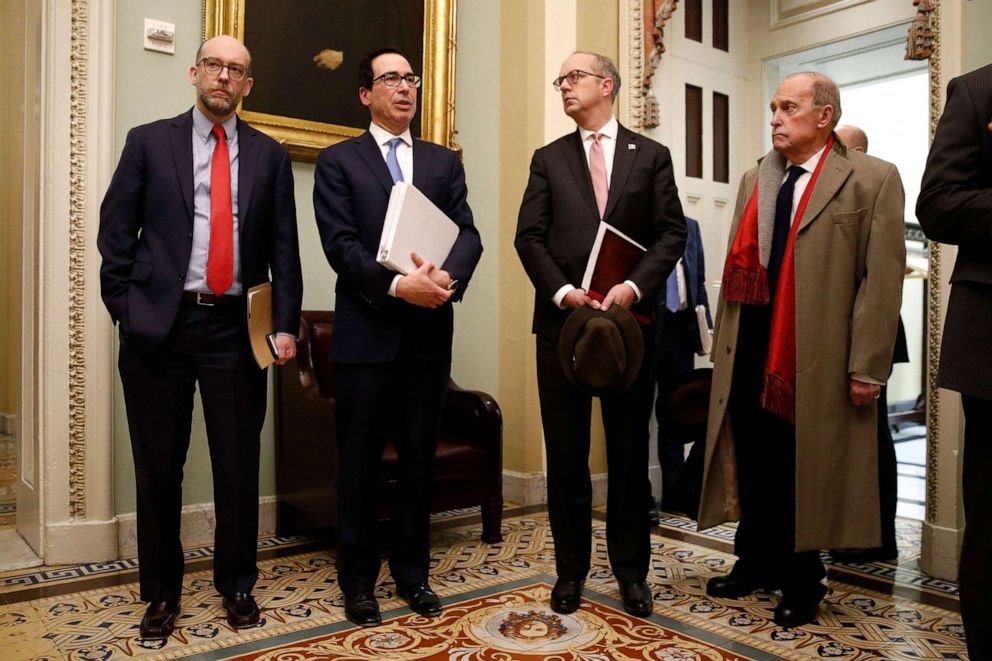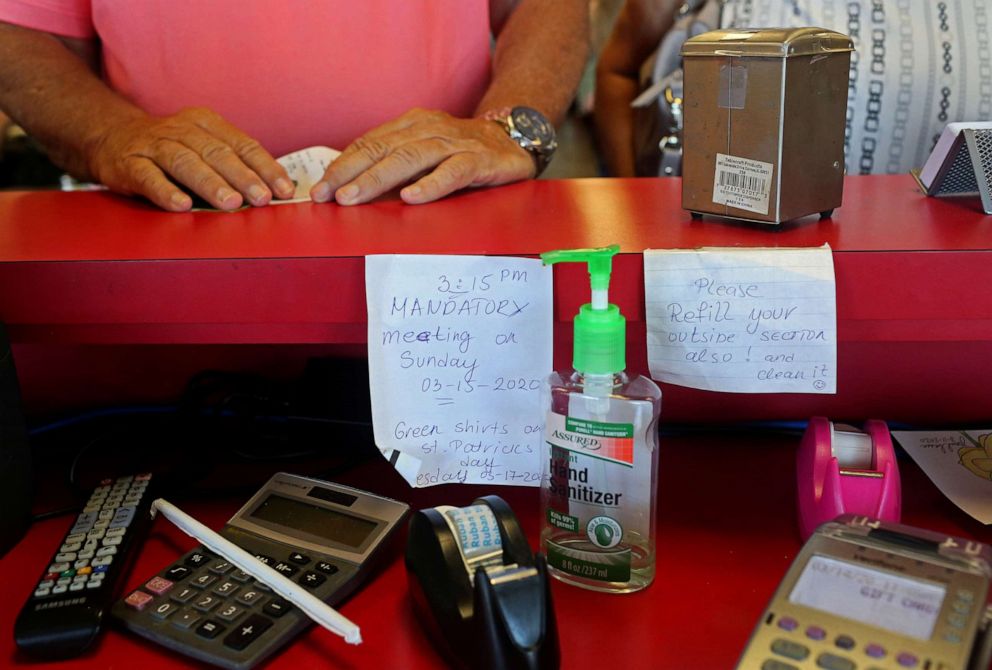The Note: Race in limbo as voting continues with caveats attached
If you’re looking for voters to sort things out, it helps to have voting.
The TAKE with Rick Klein
If you’re looking for voters to sort things out, it helps to have voting.
That will be happening on Tuesday, just most likely with far fewer people doing so than once expected. State officials in Ohio ordered the polls closed as a health emergency hours after a judge denied the governor's request to postpone and it's primary day in three other big states -- Arizona, Florida and Illinois -- with former Vice President Joe Biden expected to pad his delegate lead over Sen. Bernie Sanders.

But Americans aren’t likely to be in delegate-counting mode so long as they’re worried about their next paychecks and meals and the health of their families. Any clarity that March 17 states would have been expected to produce could be lost in a conflicting guidance from health and state authorities, plus some political feuding about what polling places should be open and when.
Biden’s team is counting on math to prevail. But applying pressure on Sanders to leave the race may look different in the context of a national emergency.
If anything, Sanders sees the novel coronavirus crisis as an argument for his vision of economic justice and health care reform – an argument to stay in, with few obvious exit points ahead. After Tuesday, the biggest voting by far will be six weeks away – and even those contests in a swath of northeastern states could be pushed back.
Campaigning as we know it may be over. But the Democratic primary campaign may not end for a good long while now.
Arizona, Florida and Illinois primaries
The RUNDOWN with MaryAlice Parks
The House late Monday night passed a revised version of the Families First Coronavirus Response Act. The bill now heads to the Senate, with the goal of providing relief and supporting families coast-to-coast during this health care crisis.
Last week, the federal government worked with health insurance companies to keep patients free from copays should they need a coronavirus test. It turns out that was just the first of several policies that mirror ideas and legislation Democrats have been pushing for years that are now being fast-tracked or reconsidered in the wake of this pandemic.
The House relief bill, for example, increases spending on health insurance for the poorest Americans and additional federal dollars for food aid. The agreement includes paid sick leave for some employees as well as paid family emergency leave, which the U.S. has never guaranteed by law nationwide. Though in the bill, larger companies with more than 500 employees are exempted and that point has drawn significant criticism in the last few days.

Republican Sen. Mitt Romney even pitched an emergency, one-time stimulus payment to all Americans.
"I've proposed a plan that would provide $1,000 to each adult in the country and that would be something which would allow them to help meet short-term needs but also encourage the economy as well," Romney told reporters Monday.
While his team said his plan was not the same as the universal basic income proposal that Andrew Yang championed this election cycle, the idea of a rush injection of cash into the hands of every adult, rang rather similar.
The TIP with Benjamin Siegel
The states with primary elections on Tuesday have spent weeks telling people to vote early and with mail-in ballots as possible, while laying the groundwork for in-person voting in the middle of a pandemic -- stocking up on hand sanitizer and moving polling sites away from nursing homes and areas with vulnerable populations on short notice. Now they'll be putting that system to the test, working to protect the democratic process and Americans' health at the same time, as a growing number of states have decided to push off their own primaries amid fears about the spread of the coronavirus.

States have disseminated Centers for Disease Control and Prevention health and safety guidelines to poll workers, instructing them to keep common areas clean, wipe down voting machines, and -- in some cases -- limit the number of people waiting to vote indoors at a given time. Some local officials will give voters the options to vote from their cars at the curb of polling sites, while others are telling voters to bring their own pens.
Officials at every level of government and campaigns up and down the ballot will be watching the day unfold with apprehension. But as Arizona Secretary of State Katie Hobbs argued in a statement Monday night, postponing the primaries carries its own set of risks.
“This decision was not made lightly, and what it all comes down to is that we have no guarantee that there will be a safer time to hold this election in the near future," she said. The longer we wait, the more difficult and dangerous it could become."
THE PLAYLIST
ABC News' "Start Here" Podcast. Tuesday morning’s episode features ABC News Chief Business and Economics correspondent Rebecca Jarvis, who explains what the latest day of stock market losses means for our wallets. ABC News contributor and former acting Department of Homeland Security undersecretary John Cohen walks us through the rise of misinformation and disinformation amid the growing coronavirus pandemic. Then, ABC News Senior White House correspondent Cecilia Vega discusses the new Trump administration guidelines for how we should behave during the pandemic. http://apple.co/2HPocUL
FiveThirtyEight Politics Podcast. The spread of the new coronavirus has upended American life overnight. In this installment of the FiveThirtyEight Politics podcast, the crew discusses how much we don’t know about the crisis when trying to assess its impact on life and politics. They also discuss how the virus is affecting plans in the states that were planning on holding primary elections on Tuesday. https://apple.co/23r5y7w
WHAT YOU NEED TO KNOW TODAY
Download the ABC News app and select "The Note" as an item of interest to receive the day's sharpest political analysis.
The Note is a daily ABC News feature that highlights the day's top stories in politics. Please check back tomorrow for the latest.





